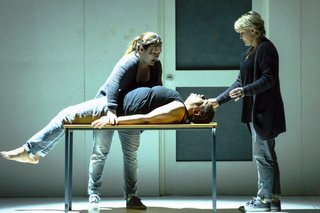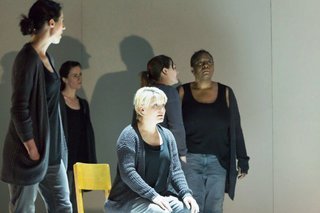|
Back
Hell in an Antiseptic Room New York
The Rose Nagelberg Theater, Baruch Performing Arts Center
01/05/2019 - & January 6, 7, 8, 9, 10, 11, 12, 2019
Philip Venables: 4.48 Psychosis
Gweneth-Ann Rand (Gwen/Patient), Lucy Hall (Jen), Susanna Hurrell (Suzy), Samatha Price (Clare), Rachael Lloyd (Emily), Lucy Schaufer (Lucy/Doctor)
Contemporaneous (Orchestra), William Cole (Conductor)
Ted Huffman (Director), Hanna Clark (Scenic and Costume Design), D.M. Wood (Lighting Design), Roth Cooper-Brown of Rc-Anne Ltd (Movement and Fight Direction)

L. Hall, G.-A. Rand, L. Schaufer
(© Stephen Cummiskey/Royal Opera House)
“I'd take cyanide no problem if it was that or throwing a cat out in the street, even a moth-eaten, mangy, caterwauling pain in the ass! I'd rather have the thing in bed with me than see it suffer on my account...though when it comes to human beings, I'm only interested in the sick...the ones who can stand up are nothing but mounds of vice and spite...I don't get mixed up in their schemes...”
Louis-Ferdinand Céline, Normance
Like Aztecs slowly flaying enemies to hear them scream, dramatist Sara Kane peeled off the artistic poetry of insanity to reach the skull beneath the skin.
Blanche du Bois would be stripped of her quiet lunacy amidst Delta jasmines. Ophelia would be disrobed of her hallucinations amidst Danish castles. In Sara Kane’s Streetcar or Hamlet, they would be screaming and babbling and sweating and battling imaginary friends and enemies, they would be yelling and yelping, not as animals but as oh so mortal humans.
Sara Kane’s plays were that way. And after the apparently autobiographical 4.48 Psychosis, she took the fatal step herself, destroying herself the way she had threatened doctors and shrinks and companions for the last years of her life. (The title digits refer to a time when she is relatively sane.)
The style of 4.48 Psychosis, in fact, is terrifyingly close to the writing of Louis-Ferdinand Céline, as shown in the quote above. Not the message so much as the violence in the syntax, the murder in the style. Mr. Céline translated that into political radicalism. Ms. Kane eschewed the metaphor and went for the jugular in the brain.
The original play was apparently so frightening and gripping that only a monomaniacal composer could attempt to give music to 90 minutes of naked lunges. Philip Venables, whose compositions have always embraced extremes, once said that–after reading 4.48 Psychosis about 50 times–he wrote it “quickly and easily.”
Neither “quick” nor “easy” are adjectives one thinks of for this literally spellbinding opera. The large antiseptically white room on the Baruch Theatre, the Muzak in the background are each ominous. The entrance of Gweneth-Ann Rand stumbling stupidly through a door is disconcerting. The bang of a bass drum–oh, that crazy bass drum up with the orchestra in a balcony above the room!–is like a portent of terror.
Ms. Rand is a woman on the verge, clinically depressed to the point of endless attempts at suicide, living in apparent isolation in an insane asylum. Alone save for four female “friends” dressed in dark jackets, who are almost certainly illusions. Save for her psychiatrist, Lucy Schaufer. Who could also be an illusion.
Typical of Mr. Venable’s music is that the Psychiatrist-Patient dialogue is never spoken. The questions and answers are flashed on the wall, word by word. The doctor’s words are hammered out on a metal pipe (or a hand-saw on wood), the patient’s replies are boomed out on the bass drum. (A question-mark is noted by a bicycle-bell!)
On the other hand, nothing is “typical” in a set which could have come from Sartre’s No Exit. The four “friends” run or leap about, they hold Ms. Rand or hug her or dance with her. Their singing is luscious and rich, amplified and natural, usually in close chromatic harmonies, sometimes in Baroque quotations, usually with a desperate chorale. In fact, these four “friends” are less a Greek Chorus than the Greek Furies, hounding Ms. Rand as they try to save her.
And our Dr. Schauler rarely speak, her voice exclaimed in the orchestra. When she does speak, across a table, it is excruciating.
Schauler: “Have you made any plans?”
Rand: “Take an overdose, slash my wrists then hang myself.”
Schauler: “All those things together?”
Rand: “It couldn't possibly be misconstrued as a cry for help.”
Where does this go? In a way, nowhere. The four “friends” and doctor arrive almost simultaneously with the patient, and for 90 minutes, the dramatic interaction of 4.48 Psychosis is total and harrowing. Ms. Rand falls and pushes, she sings–or rather she keens–her despair. The Friends repeat or comment, they try and constrain her, the plead and they surrender to her insanity.
Only four real “actions” in the whole opera. One, a lobotomy. Best not to speak of that. Another is one of the most brilliant five minutes ever: in this case, one of the Friends, Samantha Price, sits down during the chaos of the music and in an ethereal voice sings (what sounds like, possibly is) a Purcell chaconne. Rather, it is a chaconne which turns into a musical nightmare, a moment of touching beauty changed to grotesque hallucination.
Third is a battle, a quarrel, a back-and-forth hatred chorus of “Fuck you. Fuck you. Fuck you for rejecting me by never being there, fuck you for making me feel like shit about myself...fuck my father fuck my mother for not leaving him, but most of all, fuck you God for making me love a person who does not exist.
FUCK YOU FUCK YOU FUCK YOU.”
The result is neither the vulgarity or the word or the literalness of the word or the casualness in which it is spoken in 2019. Not even of the meaning. But of the aural violence, the brutal sound of the word.
Fourth is a virtual mini-opera–the words flashed on the backgrounds–of the pharmaceuticals taken by the patient. Who knew that Prozac could have such an operatic voice?
Fifth is the music–so familiar, I think from Mozart or Bach–where Ms Rand dances, is pushed back, tries to make love, is again pushed on the floor. A maniacal horror scene.

P. Venables
(© Harald Hoffman)
Philip Venables’ orchestra, deftly led by William Cole, is as unique as the drama. A trio of saxophones, a piano synthesizer and piano, three percussionists, three violas, one violin and contrabass, and accordion played by the venerable Bill Schimmel. Rarely do they play as an ensemble–but when they do, the result has the brassy effect (without brass) of a Gabrielli church ensemble. For the remainder, their sounds are almost parodies of the voices, or background shudders as their characters move on stage below them.

S. Hurrell, R. Lloyd, L. Schaufer, L. Hall, G.-A. Rand
(© Stephen Cummiskey/Royal Opera House)
One hates to call this a tour de force for Ms. Rand, an extravaganza of lyricism and movement, of internal fury and external grotesquerie. The whole work is so absorbing that one has no chance to think, “Oh, that sure is a great performance.”
Yet it is a great performance, just as the other soloists are virtuosi in their own right. The female singing not the beauty of Strauss women, but of creatures in a Dantesque hell personifying all the demons at once.
No, 4.48 Psychosis is not opera in the conventional sense, though all six players are operatic. Certainly not in conventional drama, since neither catharsis nor transformation is part of the setting.
Rather 4.48 Psychosis is quite literally Antonin Artaud’s Theater of Cruelty. Cruelty of character, knife-cutting cruelty of music, Ted Huffman’s direction of cutting, menacing, touching movement.
Sara Kane experienced both the theater and the life. She created the first and extinguished the second. And after the first death, said Dylan Thomas, there is no second. But Philip Venables has resurrected both life, theater and death in his singular creation.
CODA: 4.48 Psychosis is the first 2019 production of Prototype, a festival of American and world premieres this January. The listing and dates is too complex for these short pages, but www.prototypefestival.org gives all the information. I was about to write “opera”, but these co-productions of Beth Morrison Projects and HERE, are in the forefront of multi-disciplinary opera-theater/theater-opera events. And were I not traveling to distant climes, I’d be tempted to hear them all. 4.48 Psychosis is not exactly a premiere. This is basically the same production as the original Covent Garden production in May 2016, and the play by Sarah Kane on which the libretto is almost literally based, has been shown in America several times. Yet this is so unique and so powerful, one feels, with each note, that it has been created on the spot.
Harry Rolnick
|